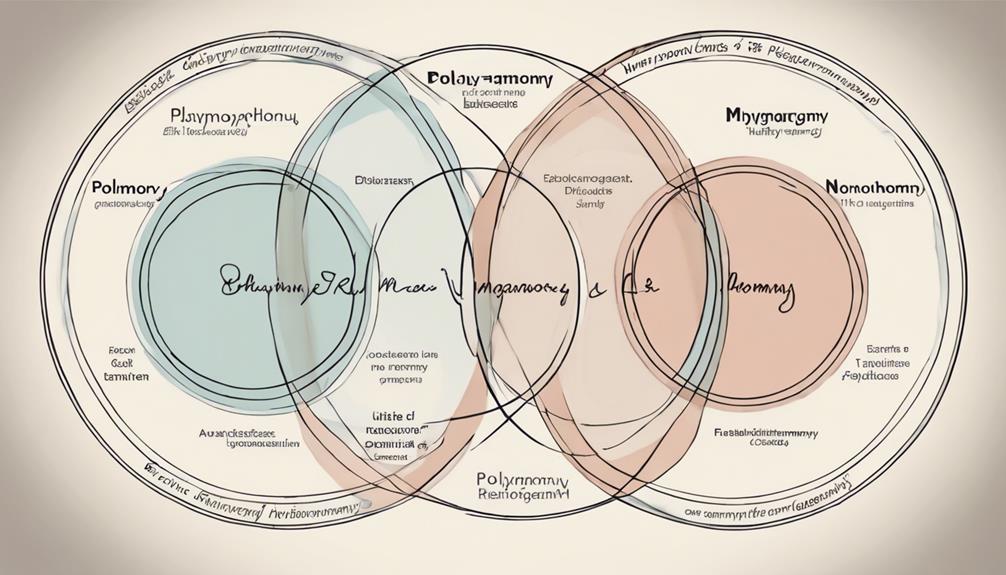Imagine a situation where a couple decides to date other people without setting clear rules or talking about ethics. This scenario represents **consensual non-monogamy**, which may not have the same ethical structure as ethical non-monogamous relationships. Want to learn more about this interesting topic and why ethical guidelines are crucial in relationships?
The distinctions between these two forms of non-monogamy delve deeper into the principles of honesty, communication, and respect. By exploring how these aspects shape each type of arrangement, we can gain a better understanding of the nuances that differentiate consensual from ethical non-monogamy.
Key Takeaways
- Ethical non-monogamy emphasizes ethical behavior and integrity, while consensual non-monogamy may lack a specific ethical framework.
- Consensual non-monogamy involves multiple relationships by mutual consent, while ethical non-monogamy prioritizes respect, honesty, and transparent communication.
- Ethical non-monogamy sets clear boundaries respected by all parties, focusing on well-being and respectful behavior.
- Ethical non-monogamy advocates for honesty, respect, and mutual agreement to dispel misconceptions and uphold commitment for all involved.
Definitions and Origins
When delving into the realm of consensual non-monogamy versus ethical non-monogamy, understanding the definitions and origins becomes crucial for navigating these relationship dynamics effectively. Ethical non-monogamy emphasizes honesty, respect, and open communication when engaging with multiple partners. It sets itself apart from cheating or infidelity by prioritizing consensual agreements and ethical behavior among all parties involved.
In contrast, consensual non-monogamy involves partners consenting to have multiple relationships without exclusivity, but it may not always incorporate the same level of ethical considerations as ethical non-monogamy. Both approaches focus on mutual consent and communication, but ethical non-monogamy places a stronger emphasis on the ethical treatment of all partners involved.
Principles and Guidelines

Understanding the principles and guidelines of ethical non-monogamy is essential for fostering healthy and respectful relationships with multiple partners. In ethical non-monogamous relationships, emphasis is placed on ethical behavior, honesty, communication, and mutual consent among all parties involved. This ethical framework sets the foundation for creating relationships that prioritize respect and integrity. Below is a table highlighting the key principles and guidelines distinguishing ethical non-monogamy from consensual non-monogamy:
| Ethical Non-Monogamy | Consensual Non-Monogamy |
|---|---|
| Emphasizes ethical behavior and respect | Focuses on mutual consent among partners |
| Prioritizes honesty, communication, and consent | Centers around agreement among partners |
| Sets guidelines for respectful and transparent relationships | Lacks a specific ethical framework |
Types of Relationships
In exploring the realm of different relationship dynamics, one encounters a diverse array of types within consensual non-monogamy and ethical non-monogamy. Consensual non-monogamy includes relationship styles like open relationships, swinging, and polyamory, where individuals engage in intimate relationships with multiple partners based on mutual agreement and understanding of boundaries.
On the other hand, ethical non-monogamy specifically emphasizes ethical considerations such as consent, honesty, and respectful communication among all partners. This approach prioritizes transparency, integrity, and honoring agreements within non-monogamous relationships.
While both consensual and ethical non-monogamy involve engaging in intimate or romantic relationships with more than one person, ethical non-monogamy places a strong emphasis on ethical principles and values, fostering a culture of honesty, respect, and responsible behavior in intimate relationships. By recognizing and respecting the diverse relationship styles present in consensual and ethical non-monogamy, individuals can navigate these dynamics with understanding and compassion.
Communication and Boundaries

Exploring the nuances of relationship dynamics, we shift our focus to the vital aspects of communication and boundaries within consensual non-monogamy and ethical non-monogamy.
In consensual non-monogamous relationships, open dialogues play a crucial role in navigating connections with multiple partners. It's essential to discuss emotional and physical ties openly to ensure transparency and trust among all individuals involved.
On the other hand, ethical non-monogamy emphasizes the importance of setting clear boundaries that are established and respected by all parties. These boundaries are designed to consider the needs and feelings of everyone, fostering a safe and respectful environment for all relationships.
Effective communication and established boundaries serve as the pillars of both consensual and ethical non-monogamous dynamics, creating a space where consent is paramount, misunderstandings are minimized, and emotional well-being is prioritized.
Common Misconceptions
Common misconceptions surrounding consensual non-monogamy and ethical non-monogamy often stem from a lack of understanding about the principles and values that guide these relationship dynamics. It is crucial to differentiate between consensual non-monogamy and ethical non-monogamy to dispel myths and foster a deeper appreciation for the importance of honesty, respect, and open communication in multiple relationships. Let's explore some common misconceptions through the table below:
| Misconception | Reality |
|---|---|
| Non-monogamous relationships lack integrity | Ethical non-monogamy prioritizes integrity, promoting healthy and consensual relationships. |
| Consensual non-monogamy is unfaithful | Ethical non-monogamy requires consent and transparency, distinguishing it from cheating. |
| Non-monogamous relationships lack commitment | Ethical non-monogamy upholds commitment and well-being for all involved parties. |
| Non-monogamy is harmful | Ethical non-monogamy emphasizes respect and the well-being of everyone in the relationship. |
| Non-monogamous relationships lack ethics | Ethical non-monogamy challenges this by advocating for ethical conduct and mutual agreement. |
Understanding these distinctions is vital to appreciating the ethical foundations of consensual non-monogamous relationships.
Frequently Asked Questions
What Is the Difference Between Ethical and Unethical Monogamy?
When we talk about the difference between ethical and unethical monogamy, we're really diving into the heart of relationship integrity.
Ethical monogamy thrives on honesty, respect, and clear communication, building a foundation of trust and understanding.
In contrast, unethical monogamy involves deceit, betrayal, and breaching agreed boundaries, causing emotional harm and eroding trust.
Upholding ethical principles is key to nurturing a healthy and respectful monogamous relationship.
What Are the Key Differences Between Non-Monogamous and Monogamous Relationships?
We understand that exploring the contrasts between non-monogamous and monogamous relationships can be enlightening.
In non-monogamous relationships, partners embrace multiple connections with consent, while monogamous relationships focus on exclusivity with one partner.
The key differences lie in the freedom to explore multiple relationships versus committing to one partner exclusively.
Both paths offer unique experiences that require communication, trust, and respect to flourish.
What Is ENM Vs Cnm?
Sure thing!
When we talk about ENM versus CNM, it's essential to understand the distinctions between them. Ethical Non-Monogamy (ENM) prioritizes honesty, respect, and mutual consent among all parties involved.
On the other hand, Consensual Non-Monogamy (CNM) involves partners agreeing to engage in multiple romantic or sexual relationships.
Both ENM and CNM offer alternative relationship structures that promote open communication and understanding among partners.
What Are the Different Types of Non-Monogamy?
When it comes to non-monogamy, there are various types that people explore. These include polyamory, open relationships, swinging, and relationship anarchy. Each of these approaches offers unique ways to navigate multiple romantic or sexual connections.
Understanding these differences can help individuals and partners find what works best for them in their relationships. It's important to communicate openly and honestly to ensure all parties involved are on the same page.
How does Swinging differ from Ethical Non-Monogamy in terms of consensuality and ethical considerations?
Swinging and choosing nonmonogamy involve consensual non-monogamous relationships. However, swinging typically focuses more on recreational sex, while ethical non-monogamy encompasses a wider range of emotional connections. Both require clear communication, consent, and ethical considerations, but the focus and intentions behind the relationships may differ.
Conclusion
In conclusion, navigating the complexities of non-monogamous relationships can be challenging, but understanding the differences between consensual and ethical non-monogamy is crucial.
By prioritizing honesty, communication, and respect, ethical non-monogamy fosters healthy and fulfilling connections.
Remember, love and relationships are never one-size-fits-all; embracing diversity and practicing empathy can lead to deeper connections and personal growth.
So, let's continue to explore, learn, and love authentically, one ethical choice at a time.









